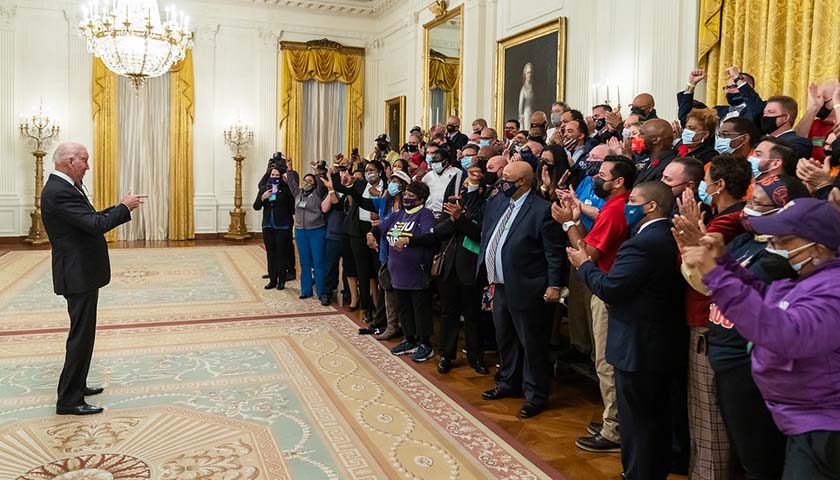by Philip Wegmann
Staff were still finding their desks at the White House when the new first lady hosted a summit to celebrate educators. There were just two guests invited on that first full day of the new administration: the leaders of the two largest public teacher unions in the country. And not that there was ever any confusion, but Jill Biden assured them both that organized labor “will always have a seat at the table.”
That has been true throughout the 46th president’s first year. For the Bidens, unions aren’t a casual part of some coalition. Labor is family. The first lady is a card-carrying member of the National Education Association. It is personal when Joe Biden promises to govern as “the most pro-union president you’ve ever seen.”
As the year draws to a close, and the job market continues to recover from the pandemic, new polling shows that Americans have mixed views on just how much influence labor unions should have. The public is split roughly into thirds, according to new polling from RealClear Opinion Research. While 28% report that unions should have more influence going forward, 23% say they should have less and 31% prefer that things stay the same.
Unsurprisingly, partisanship is a major factor with 39% of Democrats, compared to just 17% of Republicans, favoring an increased role for labor. Meanwhile, 39% of Republicans, and just 10% of Democrats, say organized labor should have less influence.
The survey also found that race had a role shaping working-class views on unions. Twenty-five percent of white working-class respondents favor giving organized labor a bigger seat at the table, with 23% saying they should have less. Among non-white workers, the number in favor of unions jumps to 37% while just 12% believe that unions should have less of a say.
These findings come from the latest RealClear survey, which for the past three years has explored the attitudes of registered voters on an array of policy issues. This poll on Americans’ attitudes toward work entailed interviews with 2,116 registered voters and was conducted Nov. 26-28, just as a new variant of COVID-19 was alarming public health experts and elected officials who hoped they were emerging from the worst of the pandemic. Among those elected officials was the president of the United States. In response to the omicron strain, Biden announced a series of actions and recommendations Dec. 2 that included booster shots for all adults. The goal, the president said, was two-fold: keeping Americans safe and “help keep our economy growing.” Regarding that second priority, it is clear what role the president wants unions to play in the future — a bigger one.
Biden has never wavered in his support for organized labor. Unions swung heavily in his favor in the last election, a fact that he regularly promises never to forget. “I can’t thank you enough for all you’ve done for the country and what you’ve done for me over my career. You’ve educated me. You brought me along,” he told labor leaders gathered at the White House in September. “And you’ve always been there.”
While labor has always been there for Biden, its influence in politics is far from guaranteed. Automation and outsourcing, along with the proliferation of so-called right-to-work laws in states across the country, have significantly thinned the ranks in union halls. Just over 10% of workers nationwide are members of a union, according to 2020 numbers from the U.S. Department of Labor, a significant drop from its peak in 1983. Back then, Biden was the junior senator from Delaware, and 20% of the workforce was unionized.
The president is eager to do his part in bolstering membership, and he rarely misses an opportunity to credit organized labor for helping him achieve his greatest legislative achievement to date. Unions lent their fair share of political muscle to getting his $1.2 trillion infrastructure plan into law. Who will reap the rewards of that spending? “Union, union, union!” Biden said last week at a stop to promote the plan in Kansas City.
“There’s a lot of good and decent people in the financial industry,” he continued, “but they didn’t build the middle class. Unions built the middle class.”
Unsurprisingly, the president’s rhetoric and his record make him more popular in union households than among the general public. According to a recent Wall Street Journal poll, union families give Biden 47% approval, while the RealClearPolitics average cites his overall approval at 43.8%.
While workers have flexed in recent months, with labor advocates dubbing October “Striketober,” the White House has not jumped into every employment dispute. Jen Psaki, the president’s spokeswoman, made clear that month that “as a standard” the administration would not speak to every strike. Biden did, however, weigh in this week on Kellogg’s plan to replace 1,400 workers who have been striking since Oct. 5.
“I am deeply troubled by reports of Kellogg’s plans to permanently replace striking workers from the Bakery, Confectionery, Tobacco Workers and Grain Millers International during their ongoing collective bargaining negotiations,” the president said in an official White House statement.
“Permanently replacing striking workers is an existential attack on the union and its members’ jobs and livelihoods. I have long opposed permanent striker replacements and I strongly support legislation that would ban that practice,” he concluded.
The statement was in line with a president who began his campaign in a union hall. And the fact that Joe Biden is even in the White House can be attributed in large part his winning back union voters in 2020 who had abandoned Democrats for Donald Trump in 2016. According to a nationwide survey by the Associated Press, union households swung hard for Biden, 56% to 42% for Trump.
Maintaining those margins as the country makes up its mind on the role unions should play post-pandemic could be central to Biden’s political future.
– – –
Philip Wegmann is a contributor to RealClearPolitics.




